#I'm a bit pedantic on this one
Text
WHAT IS MINDFULNESS VS HYPNOSIS ACCORDING TO ELLA ENCHANTING (haver of opinions)
One misconception that I often hear amongst hypnosis geeks is that "mindfulness" is basically a normie-safe word for "hypnosis"- that hypnosis and mindfulness practices are essentially the same thing.
This is a hard misconception to disprove- in fact, "hypnosis" and "mindfulness" are often defined really vaguely and in different ways by different people so- they could often very well be refering to the same thing!* I know when I first learned about mindfulness practices, I dismissed them as "just" repackaged hypnotherapy- something I already knew a lot about. However, in doing so, I was neglecting ideas that turned out to be a really useful self-improvement tools.
If you're of a similar mindset, drawing a distinction between the two may also be really helpful for you.
MINDFULNESS:
So, the end goal of mindfulness is learning a kind of grounded way to self reflect. It's a potentially really helpful skill for people who get caught in thought spirals** or overwhelming emotions. A big goal for people learning the skill is to be able to observe thoughts and emotions without entirely buying into them OR dismissing them. Let's say I have a train of thought that keeps looping in my head- I'm worried about something stupid I said yesterday at work, for example. Imagine that train of thought is an ACTUAL train- maybe a toy train running on a looped track. Normally, when you're having the work worries it's like you're on that thought train- riding it around and around in circles while you're getting increasingly anxious and kind of limiting yourself from doing other things. With mindfulness practice, the goal is to get you OFF the train- it's not gone, but you're kinda watching it from the sidelines instead of ON it. It's still happening but with a bit of distance you can see the thoughts more clearly and better take care of yourself while that thought track is running.
Another example- let's say I have a big feeling. I'm going to pick overwhelming shame***. In mindfulness practices, the goal is usually not to ignore the shame or entirely give into it but to be able to sit with it and understand it without DROWNING in it. So, in that state of mind, I might sit with the shame and kind of question why it's there and what it wants from me. I might find some kindness for myself as someone who is experiencing shame (which is harder to do when I'm more inside it). I might work to conceptualize the shame differently- what does it look like, what sounds does it make, etc. In that way, I'm paying attention to an emotion that might be helpful- but not overly giving into it.
If I were teaching someone mindfulness techniques, the goal there is for them to be able to use the techniques entirely on their own whenever they need to. I'm not really trying to overly influence or control what's happening for them- I'm keeping my language as permissive as possible and encouraging them to accept whatever comes up. "Notice what's there without feeling like you need to change it" is a common mindfulness instruction. The practice encourages curiosity and bravery in the face of the overwhelming STUFF of life.
HYPNOSIS:
There are lot of different ways people do and experience hypnosis- and I'm definitely not going to be able to address all of them here. But, at least in kink, my goal in hypnotizing someone is to directly influence their thoughts. In fact, when I'm hypnotizing someone, a lot of my "induction" is convincing someone that I'm already in their head- that they're responding automatically to my suggestions. There's the kinky control fun of that and also the mutual shared feeling of intimacy- we're so close we could be one. (Or, in more D/s-ey terms, we're so close that now you are an extension of me!) In 101 classes you'll learn about the pacing and leading technique- basically matching your subject's experience and then taking them a step further. (Ex. You're reading my words and focusing on the screen and that reminds you to take a deep breath NOW.)
Explaining it by cold control hypnosis theory****, during an induction I'm helping someone kind of flip OFF their awareness of their agency- creating the illusion that things are happening internally because I'm MAKING them happen (and disguising the part where they're in complete control of their actions).
Especially in kink, what we're doing in hypnosis play is often a really conscious power exchange. You're giving me power over your thoughts because you want me to have it. I direct them where I want them to go and away from where I don't want them to be (ex. the actual reason why you're relaxing is, in part, because that's a natural thing that happens for most people when they close their eyes for more than a few seconds). (That's an excellent babysitting/parenting pro tip from me to you btw.) It's not that subjects aren't actively contributing their own images/ideas/metaphors/desires to the suggestions and play (really often they are!) but usually their whole goal is to be directed.
Even in hypnotherapy, that directedness and control is implied. You're not coming on (nearly) as strong as you would in kink, but your goal there is usually more in direction (with teaching self hypnosis techniques as an added bonus).
Sometimes the hypnosis and mindfulness methodologies can be incredibly similar with really subtle differences! For example, I might start a mindfulness-teaching body scan in the same way that I might start a progressive muscle relaxation induction- "Go ahead and get into a comfortable position and close your eyes". But continuing with the hypnosis induction, I'll usually be more directive ("Notice your feet. As you're noticing them, imagine sending a wave of relaxation down to your toes.") whereas with the body scan I'll be more exploratory. ("Notice your feet. What do they feel like? Are they hot or cold? Do they want to move or stay still? Whatever is happening for them right now is fine- just notice them") The pmr induction is intended to move someone into a suggestible state, the body scan is intended to teach someone a particular mindset and focusing skill they can use later. *****
Like I stated before, things that I consider "hypnosis" ideas and techniques and "mindfulness" ideas and techniques get mixed up all the time- with both lay folks and the actual professionals who teach them. There's a lot of surface similarities. "Mindfulness" has become such a therapy and corporate buzzword that it often DOES become synonymous with things like guided relaxation. Both concepts are vague enough that there's a lot of things that can easily be either/or- I'm thinking self hypnosis specifically here******. But- I hope if you're curious about mindfulness at all, you'll find this explanation useful and will maybe go out and explore some helpful resources for yourself.
Good mindfulness 101 books:
Full Catastrophe Living- Jon Kabat Zinn
The Mindful Way Through Depression- J. Mark G Williams et all
Just an FYI here at the bottom- like all self-help techniques, mindfulness stuff can be extremely helpful to some and not at all helpful to others. If it hasn't been personally helpful to you that's fine! I hope you've found some other things that are. Also, you can feel free to take my self help advice just as seriously as you would of any other kinky fetish blogger. :p I'm not your therapist, feel free to check in with them about things that might help you.
*I think people expanding the definition and ideas around both of these can be really helpful, in fact!
**Of the not-fun kind
***You know, like I normally do
****One of many hypnosis theories! And often not the best one for kink! If hypnosis doesn't feel like this for you, that's perfectly ok!
*****OK, in actuality both probably do both things! But the emphasis is different.
******A big difference in my mind- if you discover pain or discomfort, hypnosis-style techniques are usually directing you away from that while mindfulness-style techniques are usually directing you towards curiousity about those things.
#mindfulness#hypnosis#hot takes#I'm a bit pedantic on this one#but that’s because I think mindfuless can truly be helpful#just takes some practice to learn#curious to hear any thoughts people have!
85 notes
·
View notes
Note
dont know if you're watching the rat - Thompson match. but he just had the biggest tantrum I've seen in a long time, not only was it totally embarrassing ,but he was also so violent with the umpire
not surprising, unfortunately. What else is there to say about that. He has anger management issues but I don't think he ever acknowledged he should work on them.
#tennis asks#bluespring asked and answered#btw i do not like the guy one bit and i despise what he very likely did#but even someone like him is human if we like it or not#so personally i'd prefer that on my blog his name gets used#i am particular about this but i really don't enjoy the self censorship#maybe not the full name so it doesn't show up in the tag... though why we should grant him that courtesy i'm not sure#sorry this is me being pedantic obviously call him what you like#but rats are intelligent and social so it might be too much of a compliment anyway 🙈
5 notes
·
View notes
Text
seeing some of the tag commentary on one of my posts atm and like. .../exhale, I acknowledge I could have been clearer re: jyl's presence at the nightless city massacre. no, she doesn't just run dramatically through armed conflict like she does in cql, u got me. mea culpa. however:
1) jyl was not the focus of that post--jgy was;
2) yes, I realize it wasn't supposed to be a battlefield (like most fields where battles take place). but it becomes one because wwx shows up and turns it into one;
3) after scattering wq's ashes, jgs makes it pretty clear that the rest of the wen remnants are going to be wiped out imminently--like, tomorrow, if we take him at his word. and when wwx hears jyl calling out for him after the fighting breaks out, even he's shocked that she's at the pledge conference. from ch 78 of the EXR translation:
Suddenly, amid the battle noises, Wei WuXian heard a faint voice.
The voice was shouting, “A-Xian!”
Like a bucket of ice-cold water, the voice doused the vile flames raging within his heart.
Jiang YanLi?
When did she come to the pledge conference?!
Wei WuXian was immediately half dead with fright. He couldn’t care about the fight with Lan WangJi any longer and put down Chenqing, “Shijie?!”
anyway /waves arms, I guess this is what I get for making one (1) tongue-in-cheek comment about jyl in a post that is otherwise not at all about jyl.
#salty peak sect 🧂#i'm not actually that annoyed about this tbh#i don't mind disagreement or discussion or to have stuff i'm wrong about pointed out to me#which is i hope something i've demonstrated frequently on my blog#this however feels um. a bit pedantic.#i was being glib because jyl being considered one of jgy's victims is absurd#and i am glib about things that i think are absurd#also as a side-note#if you are actually sorry about hijacking a post it is completely within your power to not hijack it#i don't apologize for reblogging bad takes because i'm not sorry for doing it#if it ends up in the tags it's fair game#like. reblog me to disagree w/ me that's fine but why apologize for doing the thing while you are doing it
8 notes
·
View notes
Text
Went to a panel about slash fanfic at a con. Moderator said, "Welcome to the panel about erotica." The words "slash" and "erotica" were used interchangeably throughout. Panel was great.
There was a Q&A at the end so I raised my hand and said these terms seemed conflated. Moderator explained she'd run this panel for 10 years and it started out being about slash but drifted into erotica and she never changed the name. (She also said she was glad I brought it up and would keep it in mind for the future of the panel.) The guy on the panel who writes original m/f erotica said that slash and what he writes are basically the same thing. I said I had no complaints about the name of the panel or the panelists, I was just curious about what slash meant to them, and whether slash by necessity had to include sex scenes to be considered slash.
Two panelists answered that slash was romance between men but usually had sex. Eventually one of them did make clear that slash didn't have to have sex but that it was what they wanted to read. Another panelist said that to them slash really just meant dude romance but people wouldn't read their fic unless there was sex so they felt they had to put sex scenes in.
Person came up to me after the panel. Said they felt I didn't get my question answered. Then they explained that since the 70s, 'slash' has been used to mean m slash m romance, meaning explicit and sexual. Then they said it sounded like what I wanted to ask about was shipping. They explained to me that shipping is just wanting the characters to be together but slash meant sex. They explained that since the invention of AO3, people had begun to use the ampersand to mean the fic had two characters who were friends and that the slash was used to denote ships, but even though that punctuation just meant romance, the word "slash" in the last twenty years had become synonymous with explicit fic. I explained I had been in fandom longer than twenty years and this was not necessarily my experience. They said, "Bye!"
Though they seemed confused as to whether what they personally defined as slash had been mainstream since the 70s or since the last twenty years (the person was 24), they were well-meaning. The panel was great. I'd recommend it to anyone, though I'm not stating the name of the con here because I don't want anyone involved to feel this is really a critique of the panel itself. The moderator in particular was superb.
I think that this conversation just brought up a whole lot of feelings for me. I think it bothers me that people still think that all fanfic is smutty, that all slash requires porn, and that all fic must have porn in order to be read. I am familiar with this conflation and feel perfectly fine going to a panel that I think is about slash fic and finding out it's about erotic lit, some of which is fanfic. After all, I like both, and I recognize that fandom mushes these things together and teasing them out into separate strands isn't something everyone--or possibly even most fans--have any interest in. I recognize that I am pedantic to a degree that most people find uninteresting.
I have a little bit more of a problem with the idea that slash is "basically the same" as het, but this was said by only one of the panelists. If your panel is actually about straight up erotica and not slash, then the problem is just the name of the panel.
What I found the most frustrating, however, is that whenever I have this conversation, I feel like the default assumption most of my interlocutors begin AND end with is this: smut is why we're here. And I just don't understand that. Away Childish Things has 44,800 kudos, and it has no smut in it. My next most kudosed fic has almost 15,000 kudos and tons of smut. My next most kudosed fic has almost 14,000 kudos and it doesn't even have a kiss.
I'm not talking about kudos to show off how many I have, or because I think kudos make a point about quality of a fic. They have nothing to do with quality. But they do have to do with popularity, and the truth is, sex doesn't sell. It's something else. It's not good writing. It's not a great plot. It's not in-character characterization. IT'S SOMETHING ELSE. What is it?
I've had people say to me, "Well, you're lettered; it works differently for you." DOES IT??? Maybe they meant that because enough people know me as fic author, people will read my fic anyway, but let me tell you, it's always been this way for me, long before my fic was really popular. The ones with smut did not get more praise and attention. The ones that PEOPLE LIKED got more praise and attention. Do people like fic that has smut in it more than fic without smut? Some of the time! Does there have to be smut for people to like it? NO.
Have I had people tell me they didn't want to read something I wrote because it didn't have smut? YES. But the point I'm trying to make is, there are people who want to read fic that doesn't have smut in it. THEY are your audience for the fic you want to write that doesn't have smut in it. Fic does not have to have smut to be fic; it doesn't have to have smut to be read.
I think part of the reason I get so upset about it is that slash as we know it today didn't just emerge because some people weren't getting to read smut and they wanted to. It emerged because women and queer people and other marginalized communities were not getting to see what they wanted to in mainstream media. They weren't getting sex scenes, but they also weren't getting queer content, they weren't getting stories about sensitive men that defied patriarchal stereotypes of male toxicity; they weren't getting stories about disabled folks and people of color and folks who are into kink and folks who have different lifestyles. To reduce fanfic to porn is to remove the rich history of why it exists and who it exists for.
I asked earlier what makes a fic popular, and to me, it's exactly this. It's when you read a thing and you feel, "this is really satisfying to my id in a way that I am not getting from mainstream media." And sometimes what is satisfying to your id is very horny anal sex. Other times what is satisfying to your id is Bucky Barnes getting a blanket and facing his trauma. Sometimes it's Harry Potter being trans. Sometimes it's Naruto and Sasuke getting to just hold hands as the sun sets. I have no idea who those two people are but boy howdy do I know they just fucking need to hold hands.
But the other reason I get so upset about it is I'm so fucking tired of reading a great fic that devolves into mediocre mechanical porn that is there due to the collective brainwashing that states that this is the ONLY reason ALL of us are here.
Discuss.
482 notes
·
View notes
Text
So something has been bugging me for a while now about A and N’s backstories, and while I know not everyone will be as pedantic as me, as someone who loves history and has done a lot of writing, I feel that if you’re going to write a story about vampires and give them a specific time and date of origin, then there should be a certain level of research that goes into making that background authentic. I'm not saying that Mishka didn’t do any research. It just seems that in order to keep the vibe of a happy, mellow fantasy some of the less savoury aspects of A and N’s upbringings have been left out, and it's a shame. To be honest, it feels a bit disingenuous, and it feels like an opportunity got wasted.
Let me explain (long post got long, it's 2am)
Let's take A first, since the problem is simpler here.
A is the child of a Norman lord and an Anglo-Saxon noblewoman, born in the first generation after the Norman Conquest of England in 1066. A says that these were turbulent times but that their parents had a happy marriage. Which. While I’m sure a lot of unions in that time period made the best of it, I can’t help but feel this description strips away a lot of the context of what was going on at that point in history - and removes some of the complexity about A’s thoughts on love and relationships.
Basically, after he took control of the throne, William the Conqueror stripped many Anglo-Saxon lords of their lands and titles so he could give them to his Norman buddies instead - with the added bonus that it left the Anglo-Saxons without the means to raise armies against him. The sisters, daughters, and widows of the dispossessed Anglo-Saxons were then forced to marry these new Norman lords to legitimise their power, not infrequently after all of their male relatives had been slaughtered. It’s not as if Anglo-Saxon women weren’t used to being used as political chess pieces, but the years after the conquest were brutal. It’s why William had to build so many castles. The point that I’m trying to make is that even if A’s mother was content enough in her daily life, due to the power imbalance between her and her husband, it's very likely she had little choice in the matter. She may have seen a lot of her family killed for political reasons, with the knowledge that – in an age where women had very little protection outside of their paternal household – she might be next if she made too much of a fuss.
It would be fascinating to see what effect that tension has had on A 900 years later, or even to get an acknowledgement of how much times have changed, but we don’t. We don't see how their early years affected them, how they view relationships formed naturally instead of via political contracts. And I really, really wish we did. There is so much potential there.
But A is not the one keeping me up past 2 in the morning. It’s N, and the utter detachment their backstory seems to have from the period in history they lived in as a human. And it all stems from the fact that they came from the English nobility in the late 1600s.
See, the bulk of the problem is that English inheritance law at the time heavily favoured primogeniture, where a man’s wealth would go to his first-born son. Some dispensation was made for widows and other children, but the estates, assets, and most of the money had a very clear destination.
For one thing, this makes it kinda weird that N’s stepfather would have needed an heir before he could inherit, because except in extreme circumstances everything would have gone to him anyway. Don't get me wrong, this isn't the worst part of the problem, it’s just annoying when there are more plausible reasons for him marrying a woman already pregnant with another man’s child (old family friend wanting to save her from disgrace, needed the dowry to pay off gambling debts, there was a longstanding betrothal between them that would have been tricky to get out of, etc.).
No, the bigger problem with N’s backstory vs primogeniture is firstly that at the time the English aristocracy was racist af (still is tbh) and given his pretty obvious mixed-race heritage, no court would have agreed that Nate was a legitimate son (this is for a very special reason that we will be coming back to). I say Nate specifically here because primogeniture requires the eldest legitimate son. Nat wouldn’t have inherited at all, as women in that period passed from the guardianship of their father (or other male blood relative) into that of their husband after marriage, and only gained any kind of independence with widowhood. If N had been an only child, maybe they would have been treated as a special case, but unfortunately Milton exists: the eldest legitimate son who by law will inherit everything.
Now here’s the thing. Your average aristocrat in the 17th century is very obsessed with lineage and keeping the family line unbroken. He would not, therefore, send his legitimate heir to sea to be shot at or drowned before he can carry on the family name – that joy instead goes to any other sons who need their own profession, because again, they will get very little. Nat would have had a dowry, but would never have been expected to make her own living, so I'm going to focuson Nate for this next bit.
In Book 3, if you unlock his tragic backstory Nate tells you he joined the Royal Navy after Milton went missing so that he could go look for him. And, well. This is where his backstory as Mishka tells it completely falls apart. For two reasons:
1. Even in the modern day, you can’t ‘just’ join the Navy, and you certainly can’t just jump straight to being a lieutenant – it takes years of training and after a certain age they won’t take you because they won’t be able to mould you easily enough into a useful tool. For most of the Navy's history, the process was even more involved. It wasn’t an office job you could just rock up to and then quit if you felt like it, it was a lifetime commitment. Boys destined to be officers would be sent to sea as early as 12 to learn shipboard life, starting at the bottom and moving up the ranks. These were gained by passing exams and by purchasing a commission – which is why you generally had to come from wealth to be an officer at all. Once you get to lieutenant you're responsible for a lot of people, and might be tasked with commanding any captured ships alongside the daily running of yours - it was not an easy job.
2. Even as a lieutenant (one rank below Captain, with varying levels of seniority) it’s not like you can just go where you want. In the 1720s British colonies already existed in India, the Caribbean, and up the entire eastern seaboard of North America and into Canada, and the Navy was tasked with protecting merchant shipping along these seaways (and one trade in particular that we’ll be getting to, don’t worry). Nate could have ended up practically anywhere in the burgeoning empire. He would not have been able to choose whom he served under, and would not have been able to demand his superior officer go against orders from the admirality to chase down one lone vessel because he thinks another one of the admirals might be a bit dodgy. It could not have happened.
Besides these impracticalities, there’s a far easier way for the child of a wealthy man to get to a specific point on the far side of the globe to look for their lost sibling, which is the route I assume Nat took sine she couldn’t have joined the Navy (yes she could have snuck in but she’s specifically in a dress in the B2 mirror scene so). All they'd have to do would be to charter a ship and tell the captain where to go, which is the plot of Treasure Island. It's quicker, less fuss, with less chance of things going wrong. It's even possible in the age of mercantilism that the Sewells had some merchant vessels among their holdings that could be diverted for the task. Why go through the hassle of joining the Navy and potentially ending up on the wrong side of the world when you can just hire a ship directly?
If Nate does have to be in the Navy (and let’s face it, it’s worth it just for the uniform) then it's far more plausible is that, as the illegitimate son who would not inherit because of racism etc, he got sent to the Navy as a boy and rose through the ranks to become a lieutenant. When he got news of Milton’s disappearance not far from where he was stationed, he begged his captain to go investigate in case whatever happened turned out to be the symptom of a bigger problem. Like pirates.
I like this version better not just because it makes more sense, or because it keeps Nate’s situation re: inheritance closer to Nat’s and therefore makes their stories more equal, but also because it adds a delicious amount of guilt to Nate’s need to find his brother. We know his entire crew died looking for answers, because he was selfish – that’s roughly 100-400 lives lost because of him, and we know that sort of thing eats at him.
So that's one side of the story, but if Milton wasn’t in the Navy, what was he doing on the other side of the Atlantic in the first place? Well, this is where we come to the biggest elephant in the room regarding N’s backstory as a member of the 17th century English aristocracy and potentially as a naval officer: the Atlantic Slave Trade. If you are wealthy in 17th century Britain it's more than likely that your wealth comes either from the trade itself, or from the products made with the labour of enslaved people. If you are wealthy, you want to protect your assets from attack by pirates or foreign powers so you don't become less wealthy, and that is what the Navy is for.
Regardless of N’s own views on slavery at the time – and any subsequent changes in opinion – it’s likely their family owned or had shares in slave plantations in the Americas. As distasteful as it is, it makes far more sense that Milton was on a trip to check the family’s holdings when his ship - specifically a merchant vessel - went missing. From a pirate perspective, a merchant ship would make a much better target than a Navy vessel, being slower, more likely to have valuable cargo, and less likely to have marines or a well-trained broadside.
It's not surprising that Mishka left out the subject of the slave trade given her tendency to skirt around darker subjects and general blindspot for racial politics, but it is nuance that, if it was there, would create a more grounded and coherent backstory for N that doesn’t have quite so many holes. Like with A being the child of an invader and his war bride, we could get some deeper thoughts from N about their place in the world - How do they feel to have grown up so privileged when others who looked like them were regarded as literal property? How did they feel being part of the system that made it happen? Did it inform their compassionate nature? Is it still a source of guilt or someithng they've tried to make up for?
I'm not sure where I was going with all of this. It's late, my sleep pattern is fucked. The tl;dr is that giving the vampires' backstories historical context would make them feel more multifaceted and would give opportunities for character growth that are instead missed because of a desire for a more sanitized version of the past.
#thank you for coming to my ted talk#the wayhaven chronicles#twc#a du mortain#adam du mortain#ava du mortain#n sewell#nate sewell#nat sewell#it's annoying because it’s such a small tweak in the grand scheme of things#If she didn’t want unfortunate implications she could have made N from a century later when the navy was actively trying to stop slavery#A could have been from a 50 years earlier to tie his whole family’s demise into the subjugation of the english after the battle of hastings#or a century later when the two courts had mostly integrated#mishka made choices#they deserve to be given more substance than mere aesthetics#you can tell it’s late I’m using long words
206 notes
·
View notes
Text
One day in class this week we were talking about intellectuals. I had the kids write down who they considered to be intellectual in order to break down what is actually considered intellectual vs what is pedantic.
I had this one male student raise his hand and gave two names. The first was general and anticipated. He said Oppenheimer because the movie was out and he knew a new guy. Cool, put him on the board no problem. The next though, I thought we were done with.
"Andrew Tate"
Now here's a thing about teaching. It can be crushing to not validate kids. It's always a risk to raise your hand and volunteer information. Because it is early in the school year, I don't have as strong of an understanding with students and they don't know me yet. One wrong answer, one invalidation might make the difference for the rest of the year. So I'm in a spot here. I took a deep breath and answered
"No."
I don't think the kid was quite expecting so simple a reaction and so had had the "I don't agree with everything but I agree with some of his philosophy" ready and in the chamber.
"No."
And then I started explaining that philosophy or not, Tate and all the Tate wannabes out there don't believe in philosophies a single bit. Their sole purpose is to spread misogyny and puff themselves up by subjugating women (and other men, if I am being honest). We do not give lip service to people whose goal is domination and so his name does not go up on my board.
There wasn't a round of applause or a standing ovation or anything like that. 12th graders are waaay too cool for any of that. But I noticed an easing of tension in some of my students. My class became a little safer for them. Those that were laughing at first about the Tate suggestion were no longer laughing. They knew where I stood and knew not to push it. They knew that the jokes wouldn't fly.
I thanked the kid for the opportunity for a teachable moment and suggested he find better heroes. And honestly? Honestly he apologized. That's it right there. He's going to remember this moment next time. He thinks twice about it. He knows that there are some areas where he has to watch what he says. It isn't a lot. But it is what I have to make a small change. Kids hear their teachers calling out misogyny and it gives them license to do the same. It halts the behavior. Maybe it is only in my class and maybe it doesn't stick forever. But they will remember. And it gets a little harder to be sexist.
I have a lot to learn and I know I make mistakes, but I hope I can apologize when I fuck up too just like this kid. Lord knows I was once a teenage asshole as well. Shit, hopefully by posting this I haven't made some error in my reasoning. But if I have, maybe that'll be a teachable moment as well.
344 notes
·
View notes
Text
Word changes...
All of the following is IMO, so YMMV. :->
*****
Anyone noticed how "weaponry" is used nowadays in places where "weapons" would work just fine (and is often more correct)?
Yes, they ARE interchangeable, sort-of, but it's clunky and sounds to me either slightly journo-pompous or like a failure to remember the right word so plugging the most similar one into its place.
ETA: I checked one of my dictionaries, and while "weapons" is more modern, "weaponry" is an obsolete word which has come back into favour. I wonder why...?
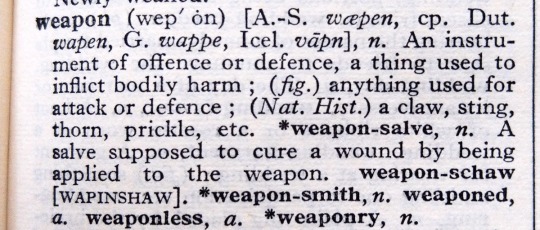

*****
"Decimate" turns up all the time, usually when the correct word is "devastate".
Merriam-Webster says: "It's totally fine to use 'decimate' as a synonym for 'devastate'. This is why."
Beg to differ.
As the M-W article points out, "decimate" originally meant a Roman military punishment applied to one man in ten of a guilty unit. (Initially execution, but this had a rotten effect on unit morale, so it was reduced in severity to fatigues, extra drill or restricted rations.)
That's now considered a far too specific meaning and only linguistic pedants dig their heels in. Quite right too, and I speak here as a (bit of a) linguistic pedant...
However, it remains a useful word for more generalised incomplete destruction of living things - saying a regiment, flock, herd or population was "decimated" implies there are some survivors without quibbling over how many tenths. If totally wiped out, however, that's when words like "destroyed" or "obliterated" are more appropriate.
On the other hand something inanimate like a factory, city or region would be "devastated" - and in addition, saying someone is emotionally devastated is understandable, but saying they're emotionally decimated is peculiar.
Two words, several meanings.
It's like cutlery: a spork can replace knife, fork and spoon, but individual utensils give a lot more precision and variation of use.
*****
There are also a couple of real howlers, not just transposed words but actual errors.
One I've heard several times is using "siege" (a noun, or thing) instead of "besiege" (a verb, or action).
For reference, there's a term called noun-verbing, and the practice is quite old: "table the motion / pencil you in / butter him up / he tasks me", but all are either when there isn't already a verb-form of the word, or as a more picturesque way of saying something.
(Interesting side-note about "table the motion": in US English, it means "to postpone discussion" while in UK, CA and I think AU English, it means the complete opposite, "to begin discussion". Why there's this difference, I have no idea, but it's worth remembering as a Brit-fix when writing, also in a real-life business context.)
There IS an existing verb for the action of surrounding a castle and cutting it off from outside help, and that verb isn't "sieged". It's "besieged" or "under siege". Anywhere using "sieged" as a verb is wrong. The Firefox spellchecker in Tumblr Edit Mode is telling me it's wrong right now.

Merriam-Webster, I'm looking at you again.
*****
There's also "coronate" used as a verb. "The King was coronated at Westminster Abbey". Nope. He was CROWNED.
Coronate is an adjective (meaning crown-shaped) and was coined in in the 1600s by a botanist, as a word to describe the shape of certain plants.
The current Royal-associated usage seems to be a bastard back-formation from "coronation", because the act of putting on a crown is the verb "to crown".
This is almost identical in German, French, Italian and Spanish, with noun and verb the same. The only difference is that their verbs have, what a surprise, verb-endings (-en, -er, -re and -ar) on the noun while English does not.
Because English doesn't like to make things that easy...
"Coronated" might be people trying to sound archaic, or those who've bought into the dopey "said-is-dead" school, who perform any linguistic contortion to avoid common words, and who've been taught that repetition in a sentence - "crowned with a crown" - is BAD.
Is "coronated at a coronation" in some way better?
Guess what's got uncritical examples...
If that's M-W scholarship, I'll stick to the OED and my old but utterly reliable New Elizabethan Dictionary, thanks very much.
*****
Language is funny: sometimes funny ha-ha, sometimes funny annoying, but often just funny peculiar, because English etc. etc...
80 notes
·
View notes
Note
Hey there- I need some help. I'm one of the RAs at my college and I have two residents who are constantly bickering. One of them is a total stoner type who's never seen the inside of a gym and the other is a stereotypical dumb jock bro. They don't see eye to eye on anything and its been driving me crazy. I'm wondering if there's anything I can do to resolve their issues. I was thinking of using the merge feature or something on them but wanted your thoughts
Shit, RA is a really shitty job! Kudos to you for taking it on. And if there's anything I can do to make your life more comfortable, I'm happy to do it. Merge is definitely a good idea in this case. Being a bit more sporty is certainly not bad for the stoner. And for the gym addict, it's certainly not a bad thing to become addicted to something else.
The two of them are in the kitchen arguing again. The jock wants to cook his chicken breasts and rice. The stoner wants to heat up a frozen pizza. Both are constantly getting in each other's way. And then the jock's buzz cut starts to change. His hair doesn't grow. It's growing. And becomes matted. The two of them have a first-class dreadlocks look. At the top of the head. The sides and neck of the jock remain shaved. And the stoner also gets an almost military-correct haircut on the sides, only on the sides. His fluffy beard also looks freshly trimmed. And the jock's facial features, chiseled as if from granite, are covered by a scratchy beard shadow. The cooking dispute is settled. They both cook chicken with rice. The stoner's scrawny neck grows bigger and bigger. Until both have a neck that is almost wider than their heads. The pale, unhealthy color of the stoner's face begins to match that of the jock. In return, the jock's skin begins to change color with tattoos similar to those already adorning the stoner.
The stoner's scrawny body begins to bloat. He makes his pectoral muscles dance. The jock does a chest bump with him and makes his pecs dance in equal measure. It looks like a ballet.
"Dude, do another joint before dinner?" asks the jock. The stoner grins and takes a freshly rolled joint out of his dented cigarette case. "Sure thing, dude!"
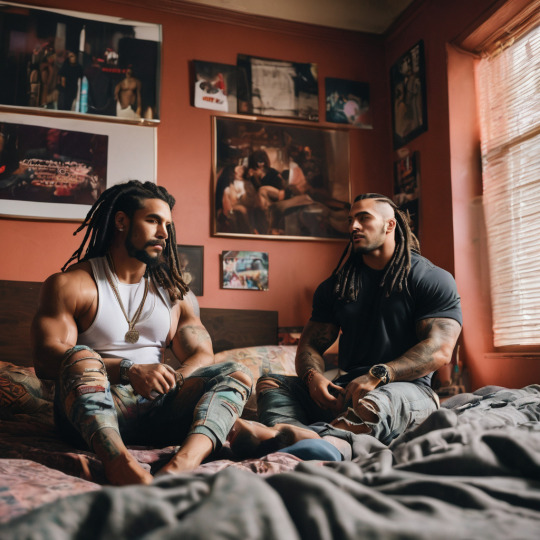
The rice burns. The smoke detector in the kitchen sounds the alarm. The two of them are sitting on the bed in the jock's dorm room, stoned out of their minds and giggling. Shit, it's the same with these two every time. Maybe you'll find yourself another pedantic nerd and merge the two with that one.
69 notes
·
View notes
Text
An Interesting Character
Usually, when character is brought up in discussion, it is in reference to the people. If you think of the characters of The Owl House for example, you probably think of Luz, Eda, Bellos, Hunter, and Principal Bump.
But, by pure mechanics, a character is just a force at work in a story. One with personality, and agency, sure, but it's just a force.
This means that, if you squint a little, the Boiling Isles itself is a character, and the Wild Magic is an extension of that. It certainly gets treated like a character by the story, especially in Adventures In Elements.
Let me explain.
SPOILERS AHEAD

Before I start, let me give one attempt to argue with the pedants. By definition, a character is a person. So, hear me out, the Boiling Isles is literally the body of a titan, who actively talks to Luz later on in the series. That is my justification.
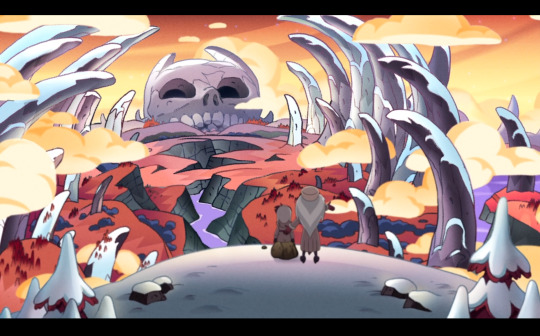
So... why is wild magic a thing?
I'm not asking for an in-universe answer, because that is multifaceted and not really the point. I'm asking why the writers decided to include this idea, and what effect it has on the story?
The phrase "magic is..." is used four times in this episode. Once by Eda, and thrice in quick succession by Luz. And it is worth taking a look at these statements.
"I know my lessons seem weird, but this is what wild magic is all about! Making a connection with nature. The earliest witches understood that. Human witches need to understand it, too. You wanna learn a second spell? ... Then you have to learn from the island."
There is a lot going on with Eda's guidance. First up is the small detail about the tense. The earliest witches knew that magic is about nature, implying now it is different. But mainly, this is an explanation of the nitty gritty of The Owl House's magic system. It's about two things, nature and connection. And I want to delve into that a little bit.

There is something fascinating about Bellos and his roots in witch-hunting. Because that was specifically defined by an opposition to things, rather than any actual views of its own.
Malleus Maleficarum, the book that kicked off the witch-hunts is a fascinating read, as long as you understand what it is that you are reading and don't use it as a set of instructions. Internet Archive has a translated version by Prof. Christopher S. Mackay, complete with commentary from latter authors that I highly recommend.
This single book caused a ton of harm to people, and you can examine it from almost any angle you like. The original was written by a terrible person with terrible intentions, and I also recommend Overly Sarcastic Productions' video on Werewolves for more information on that section of history.
What I want to focus on is the vernacular. References "devils" about 400 times and namedrops "witches" with similar regularity. The word "demon" comes up over 1000 times, and the word "pagan" comes up about 40 times. Specifically in reference to "pagan nations" which is about as racist as it sounds, as well as a ton of using the word as a catch all insult ("x type of person is worse than a pagan", etc. etc.). I don't want to get into the theology and history of this word, because it's a complicated minefield. But in this context, specifically around Europe in this time period, it means just about all regional faiths and mythologies. Celtic, Norse, Germanic, and several others.
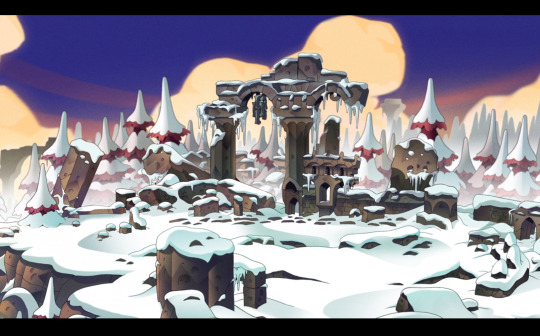
Fun fact about me, I am Welsh, which means is that I have a connection to Welsh mythology, and so my analysis of wild magic is through that lens. If you have an understanding of other similar cultures, let me know, I'm fascinated to learn how that affects the reading of the Owl House.
Now, Modern Druidism is a living religion that I am not well versed in and want to treat with the respect befitting any living faith. So, I am sticking to what I know about the history and mythology and trying to make the differentiation between those two and Modern Druidism clear.
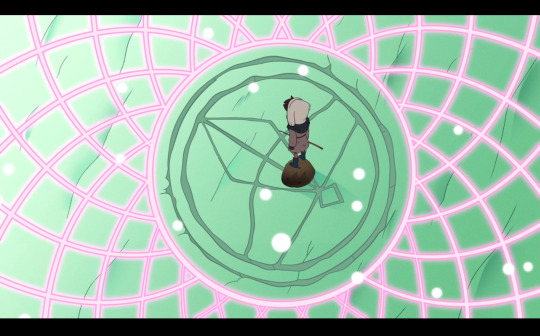
So, Druids in Celtic mythology are religious leaders, and peacekeepers. But what is possibly the most famous thing about them is their connection to nature. And here is where the analysis of The Owl House comes into play. Because the Owl House takes great care to associate magic with the natural, and Bellos with the unnatural.
"It means magic is a gift from the island. It means magic is everywhere. Magic is everywhere!"

Bellos creates artificial magic through his artificial staff and the destruction of the Palismen to fuel his life. Hunter wields an artificial staff, and in Adventures In Elements, Amity trains with an artificial training wand, which is linked to Bellos through the coven system.
But you would think that Luz's runes would also count as artificial. So what gives?
This episode shows them as part of nature more than the more refined spell circles. Luz's magic is that connection to the island in its purest, rawest form, and as I have said before, Luz's greatest strength is her ability to connect.
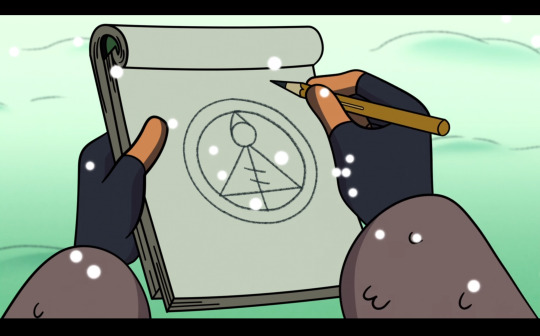
The dynamic between Wild Magic and Coven Magic isn't a dynamic between the artificial and the natural, it's a dynamic between empathy and utilitarianism. Wild Magic borrows, or is gifted, Coven magic takes and uses for its own ends. They are similar concepts, but it's in the minutia that the meaning comes out.

Final Thoughts
There is one final thing that Wild Magic reminds me of, and its off on a limb a bit. I currently live in Australia, and while Aboriginal spirituality is varied and complex and not my story to tell, I have been gifted this piece of advice that I would like to share: Humans don't own the land, we are a part of it, just as the trees and the beasts and the storms and the fires. Humans are mere custodians, our duty is to watch over and protect, and to connect.
I thought that was relevant.
I am away next week, but I'll be back in the new year with some analysis of The First Day, so stick around if that interests you.
Previous - Next
#literary analysis#rants#literature analysis#what's so special about...?#the owl house#toh#character analysis#wild magic#witchcraft#titan magic#owl house
86 notes
·
View notes
Text
i'm thinking so hard about the dhmis trio's characterizations and how interesting i find all of them. let's start by framing this discussion with a quote from this interview
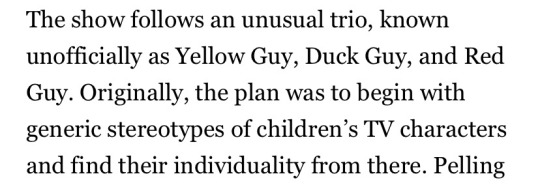
i want to talk about them in terms of their surface levels and their hidden depths. you can see the roles that they're supposed to play on the in-universe "show world", but then you dig deeper and you find something more real.
...
yellow? plays the role of the innocently stupid one who's always the butt of the joke and can't see that his friends are jerks.
but we find out that he's the one with the most awareness of their situation and that his knowledge was literally taken from him. and he knows full well that his friends are jerks! throughout the show that is made clear. and even after he's functioning at full power and he admits that he thinks his friends are trying to control him, he still loves them enough to bring the book back to them so that they can all escape. he's shown to be genuinely kind, not just unwittingly innocent. and even when he's at low power he displays some memory of their situation, but he just can't express it.
red? plays the role of the chill and laid-back one who's always handy with a sarcastic comment and doesn't care very much.
but we find that he cares quite a bit about many things. he seems to have a rather sensitive heart, is prone to existential dread, and is distressed by the nonsense of their world. he wants so strongly; he wants something better, something more gentle and more sincere and more real than all this. he wants to feel comfortable somewhere but can't quite find that in either this life or any other. he's curious and imaginative but repressing it due to arbitrary standards, whether it's by the show world's rules or social rules (original 6's "real world" and new 3's illusion of a family).
duck? plays the role of the the high-strung, fussy one with an overinflated ego, dramatic emotions, and a sharp tongue.
but we see that, even if he can be cruel, he finds comfort in being with his friends and loves their daily life together. he sees them as a family! he can't just be by himself, and he genuinely doesn't want them to be separated. and pedantic as he is, he seems blind to the inconsistent nature of their reality. it's only when the status quo of their daily life is disrupted that he really freaks out, like when yellow goes off-script in 6 or when red disappears in the original series' 5. but this also makes him grounded in who he is; he just does not assimilate into new roles as well as the other two, and as dramatic as he is, he's often the most stable.
...
and it's their inner traits that lead to their downfalls, when they do occur. yellow's love leads him to go back downstairs and lose his memory over and over and over again. red's curiosity for more strands him outside of his world with no way back in besides intervention from a higher level, in both the original and new series. duck's stability makes him unable to deal with some lessons and thus liable to be violently removed or changed (perhaps this is why he seems to be so often replaced?), in both the original and new series.
and they all have their deeper personalities masked by the roles they must play in this tv-show-world. yellow's is most easy to see, because he is literally forced to lose all memory and return to his role as lovable idiot, but the abrupt shift in demeanor that red and duck experienced in 6 when a ray of stage light came back into the dark is also notable, as was red's sudden reset from desperate in 5 to apathetic in 6, right after the group came too close to knowing what was going on.
and on a level wider than the individual characters... you can see it with the undercutting of any almost-sincere moments by gags. you can see it in how full of holes their memories are. there are moments where their selves beneath the roles shine through anyway, but the status quo is always god. nobody can grow or change or be anything other than what they are supposed to be. and that's the tragedy of it
#dhmis#dhmis red guy#dhmis yellow guy#dhmis duck#dhmis theory#not really this is more of a character analysis. but#it's 'dhmis is a tragedy' hours with am#am.txt#dhmis analysis
814 notes
·
View notes
Note
I've been wanting to get into paleoart for a while now but have been hesitant because I'm not sure what reference material would be the most accurate. Do you have any recommendations?
Very important first thing: There is no "most accurate". Instead of accuracy its better to look for credibility. What is regarded as accurate is constantly changing anyway.
Finding good references can be tricky because not only are there cranks out there producing crap but also the amount of literature on certain topics can be either too big to get an overview for, too little to really get anything useful out of or behind a paywall, denying access.
Also it depends on the organism you want to reconstruct. You will find 10+ very good skeletal drawings and 3d models for T. rex, and yet more are produced every day (please stop guys, we have enough) but other species will be basically devoid of good material to work with.
The solution isn't straight forward. It takes experience and even we professionals sometimes pick the wrong/outdated references.
It helps to learn by observation and example, since there is no definitive source. Sometimes people post skeletal drawings they used or produced themselves and sometimes new publications provide insight. Good people to look out for are for ex,plr Scott Hartman, Matt Dampsey or @arminreindl.
Avoid at all cost the work of David Peters (reptileevolution.com and pterosaurheresies)
Also, since this comes up especially on twitter: try to ignore pedantic comments. Learn from them if you can but don't take them too serious. There are too many killjoys and assholes out there.
A last bit of advise, don't take it toooo serious at first, if you make "mistakes" see them as an opportunity to learn but first and foremost have fun. All the best references in the world can't help you if your images weren't fun to produce. The artistic side is just as important as the scientific one.

116 notes
·
View notes
Note
okay, I'm super curious about your thoughts on when and how snape becomes a potions master. some people say he was still working on his mastery when he became a professor but i like to think he got it in early 1980 and he apprenticed with a potions master he was recommended to through his ~connections~ (cough malfoy cough).
although the idea of him teaching and grieving and also attempting to not fail at the one thing he knows he's good at does have its own angsty appeal
thank you very much for the ask, anon!
although i regret to say that i'm going to start the answer to it by being very pedantic...
the idea that masteries are something which exist in the wizarding world is complete fanon.
they have emerged as a trope due to a reading of the phrase "potions master" which does make perfect sense outside of the cultural context in which the books were written - by which i mean that it makes readers unfamiliar with the culturally-specific meaning of this bit of language think of masters degrees or other high-level qualifications - but which is nonetheless incorrect within context.
"master" [and the feminine equivalent, "mistress"] is just an alternative term in british english for "teacher". it doesn't imply anything about a level of qualification. "potions master" and "potions teacher" are synonyms.
the term is archaic - british people nowadays would exclusively say "teacher" - and it's very class-specific, in that it would have particularly been used to describe teachers in elite schools, whether fee-paying private schools or grammar schools [state schools which are academically selective].
as a result, it turns up in lots of the children's literature written before c.1980 - especially in boarding-school stories like malory towers and the worst witch which are explicit influences on the harry potter series. it's used in the text - especially in the earlier books - as part of worldbuilding which generally seeks to make the wizarding world feel whimsical by virtue of being very old-fashioned, which things like the fact that the most advanced technology wizards use is the radio and the steam train also hammer home.
that snape is the only teacher referred to as a master is connected to these genre conventions. because snape is so important to the full arc of the story, he's the teacher we spend the most time in the classroom with throughout the six books in which harry's at school. and he's therefore the teacher who - in the first few books - best fits a children's literature archetype which we would expect to find in any twentieth-century school story [with a magical setting or not] - the hated schoolmaster who is horrible to the child-protagonist and who every child reading can't wait to see get their comeuppance.
so snape is a potions master because he teaches potions. nothing more than that.
but that doesn't mean that it's not worth thinking about his training...
clearly, higher education of the type most of us are familiar with doesn't exist in wizarding britain - nor, i suspect, in wizarding europe more broadly.
and this makes perfect sense - not only because the magical population is so small but because the divergence of the magical and muggle worlds in 1689 takes place well before universities and university-level education look like anything a modern student might recognise. a seventeenth-century university education was still broadly generalist and aimed at trainee clergy, and careers which we would nowadays expect to require a degree - such as law, finance, medicine, science, and engineering - were generally taught by apprenticeship.
this is clearly how things continue to function in the wizarding world of the 1990s, since we know from order of the phoenix that healers are taught by apprenticeship [and, indeed, that hogwarts graduates all go straight into the workforce after they leave school].
potions - since it's analogous to chemistry - is nonetheless understood in-world as an academic discipline. but this doesn't mean - within the post-school educational structures we can suppose the wizarding world has - that it's a discipline in which one needs specific formal training in order to acquire a right to teach or publish about it.
the seventeenth century was a period - especially in britain - marked by a great expansion of scientific enquiry. this was - by our contemporary understanding of academic science - amateur. scientists wouldn't have been expected to have doctorates, to work at universities, or even to have attended them, and their experiments were often self-funded by personal wealth or dependent on a patron. the circles [often international] in which they debated, demonstrated, and reviewed theories and inventions were social ones - the gatekeeping line was class [with the level of education - and, primarily, of literacy - that this implied], rather than level of education itself.
these social circles often had a certain level of official standing - by which i mean they became, during the period, the learned societies, the most famous of which is probably the royal society. membership [or fellowship] of the learned societies requires a demonstration of some sort of contribution to the discipline they relate to - which means that the vast majority of contemporary fellows of such societies are university-based academics. but this wouldn't have been the case in 1689.
and we know that the wizarding world has its own equivalent of learned societies, because slughorn mentions one in half-blood prince - the most extraordinary society of potioneers.
which is to say, snape is probably a member of this society. he may very well publish papers in academic journals connected to the subject [as dumbledore does in transfiguration today], and he undoubtedly has a reputation among the wizarding world's men- and women-of-letters. but he doesn't need to have any formal post-hogwarts qualification in order for him to have acquired this reputation.
so what do i think he's doing between 1978 and 1981?
well... he's a death eater.
my theory has always been that snape comes to voldemort's attention - via lucius malfoy - because of his potions skills. the dark lord's operation would have needed potions - poisons to bump off enemies, healing potions because wanted criminals can't just turn up at st mungo's, potions to trade on the black market [as aberforth dumbledore tells us the death eaters do during deathly hallows], and so on - and voldemort would want to keep the production of these potions in-house, rather than risk hiring a private brewer [even a shady one] who might change their mind and go to the aurors.
[this is also presumably what voldemort - undoubtedly at snape's request - tries to recruit lily to do.]
i have never believed that snape was taken on as a death eater in the expectation that he'd perform a combat role - there is a clear implication throughout the series that the only person he ever directly kills is dumbledore, and that he gets along badly with death eaters [such as bellatrix] who did take more violent roles in voldemort's terrorism.
so i presume that, when he leaves school, he ends up working as a personal brewer for voldemort - on a stipend presumably paid, at the dark lord's request, by either lucius or abraxas malfoy. i also presume that, outside of work voldemort specifically requests, he's given free reign to brew for other clients, study, experiment, and publish as he wishes.
and i further presume that if he trains with anyone, then that person is voldemort himself.
voldemort claims, in goblet of fire, to be interested in experimenting with potions. he appears to invent the potion made from nagini's venom which sustains his half-body prior to his resurrection - and i think the implication of the text is that he also invents the potion guarding the locket-horcrux. voldemort also evidently encourages snape's interest in the dark arts, and he also appears to have some influence over snape's comportment - the teen snape we see in order of the phoenix is extremely rough around the edges, in a way the adult snape, who both speaks and moves in canon very similarly to the adult voldemort, isn't.
voldemort taking such an interest in snape would - obviously - largely be a grooming tactic. snape clearly becomes a death eater because the organisation offers him a chance to belong and succeed which his class-background would ordinarily make impossible for him within wizarding society, and voldemort must therefore massively indulge his belief that he's never given the respect he deserves for his intellect. voldemort's obvious contempt for slughorn - who matters so little to him that he doesn't even bother to kill him - would, i imagine, also win snape round.
and by training snape in an academic rather than a combat sense, voldemort gains a valuable tool - someone he can place at hogwarts as a teacher to spy on dumbledore.
we can assume that voldemort was having dumbledore tailed throughout the first war - and, indeed, that this is what snape is doing when he overhears the prophecy - but that he couldn't watch him at all times because he didn't have a spy among the hogwarts faculty.
it is clearly voldemort who tells snape to apply for a teaching job in early 1980. he must also tell him to apply for the defence against the dark arts post [which we know snape canonically applied for first] - which means he must expect to be imminently victorious in the first war, since snape would only be able to stay in the position for a year...
the prophecy, which snape hears c. january 1980, obviously derails this belief slightly... and snape famously does not get the defence against the dark arts job for the 1980-1981 academic year.
how do we know this? because he tells us in order of the phoenix that he's been teaching at hogwarts for fourteen years. he says this right at the beginning of the autumn term in 1995 - so he clearly means that he's been teaching for fourteen previous academic years and the 1995-1996 year is his fifteenth. so... he started teaching at hogwarts in the 1981-1982 academic year.
voldemort settles on harry as the child the prophecy refers to after harry is born [so, after 31st july 1980]. we don't know how quickly he does this and we don't know exactly when snape defects to the order.
but, clearly, at some point during the 1980-1981 academic year, dumbledore hires snape to begin teaching from september 1981 onwards. he presumably tells snape to tell voldemort that his change of heart was because he didn't think snape was qualified to teach defence against the dark arts but that he does think he's qualified to teach potions [pointing, perhaps, to publications snape got out under voldemort's tutelage], and that slughorn's announcement that he intends to retire means that there's a position available. he then undoubtedly also tells snape to convince voldemort of the same pretence they'll use throughout the second war - that he's a loyal death eater passing information on dumbledore's movements to his master.
which is to say... when lily dies, snape has been in his job for at most nine weeks.
just imagine how miserable that must have been!
38 notes
·
View notes
Text
I've been enjoying recaps / reviews of Star Trek Voyager by a YouTube channel called Unlimited Lives (link is to the channel's playlists of Voyager by season).
It is both amusing and insightful. He's almost done with the whole of Voyager at this point, and on the verge of starting Deep Space Nine.
As with many things, the first reviews are a bit rough, and start off harshly enough that one might mistakenly think the reviewer doesn't like the show.
The episodes only improve with time, however, and gradually become longer as the reviewer includes more and more of his thoughts, conclusion segments, and comedy bits at the end. Praise is given as earned while never going easy on the show when there is actual nonsense to call out.
The review show starts out titled "Reviewed (by an ar*ehole)", but shifts to "Reviewed (by a pedant)" by season four. Whether this was to satisfy YouTube, or to intentionally reflect the evolution of the series, it reflects the evolution of the series.
Oh, and I suppose harsh language warning, though it's not in overabundance (this isn't angry nerd cursing, just some language tossed in here and there). I'm not sure if anyone on the internet is that concerned about such things, but I may as well mention it.
23 notes
·
View notes
Text
@drarrymicrofic
Prompt: quixotic
After the war, Draco had flung himself headfirst into reformation as though it were the latest fad. In actuality, it was the latest fad, and the entire Slytherin set was determined to outdo each other.
Pansy threw glittering gala after gala, with proceeds going to war orphans funds, regeneration funds, bereavement funds. Blaise donated generously, always managing to discreetly slip a luxurious envelope from the breast pocket of his impeccably-tailored robes just as a photographer was passing by. Theo founded a charity of his own, which purported to identify and redirect radicalisation of youth.
Pansy had a field day planning that inaugural gala. She managed to get Draco photographed exchanging uncomfortable pleasantries with Potter, which of course stirred up the coverage around the various Slytherin paths to redemption.
Draco didn't attend to that very much, though, because there was still so much to do. He'd burned through what was left of the Malfoy inheritance following the war reparations - and there had been several full vaults remaining, even after that - giving to every cause that had so much as glanced his way. Pansy had tutted and suggested his charitable efforts, while noble, could stand to be photographed. Blaise had pulled him aside and explained that people remembered donations over a long period more than all at once.
Draco had quietly finished turning out his pockets, then applied to Hermione Granger's new intern programme. She'd looked at him, exasperated, over the cluttered desk on the day of his interview and asked what on earth he thought he was playing at.
Draco shrugged and quietly said that she'd always seemed to know what to do with Weasley and Potter, and they were even more stubborn and significantly less skilled than he was.
Harry, who was also on the interview panel, squawked in offence, but Hermione tilted her head thoughtfully to one side, and three days later, Draco received a bland notice that his application had been accepted.
"I hope you won't be an utter tit anymore, Malfoy," had been the surprisingly cheerful welcome Harry had offered on Draco's first day, and Draco had said he couldn't make any promises, given that the entire endeavour was objectively ridiculous. Harry had bristled at that, and Draco corrected himself.
"Optimistic," he'd suggested. "Nobly intended but perhaps not so practically...oh! Quixotic!"
Harry's brow unfurrowed, but his arms remained crossed and his eyes stormy, so Draco hastened to explain further.
"The whole thing's a bit earnest, really, isn't it? I don't see how anyone fails to make a tit of themselves tilting at windmills?"
Harry's shoulders relaxed, and now he threw his head back and laughed. Four years later, he would torture the metaphor so thoroughly in front of a windmill outside of Amsterdam that Draco wouldn't understand he was proposing until Harry finally dropped to one knee, thrust a ring under Draco's nose, and snapped, "I'm asking you to marry me, you pedantic wanker."
But today, Draco only unclenched slightly at Harry's laughter. They have a long road to walk, lined with windmills, before they get there.
63 notes
·
View notes
Note
the way you describe the jealousy system makes the difference between "jealous over" and "jealous of" sound more like the difference between jealousy and envy. I'm sorry if this sounds pedantic, I just thought maybe those two terms would be a bit less confusing without further explanation. I'm super excited for OL2 either way, I love the series with my whole entire heart! Stay hydrated!
Thanks, I'm glad you like the games! I get what you mean. The concern I have is that not everyone will know what makes 'jealous' and 'envy' distinct feelings. They're often treated as synonyms. For some people it might come across as 'jealous 1' and 'jealous 2', with no hint of what you'd get by choosing one over the other. Putting 'jealous over' and 'jealous of' makes an attempt to differentiate the feelings more actively. Maybe we could put in 'envious' to replace using 'jealous' a second time, but we'd have to keep the 'over' and 'of' part. Having just 'jealousy' and 'envy' wouldn't be enough, I don't think.
It's always hard to pick a single word or two to express an entire dynamic, aha.
FAQ
Ask Archive
Update Only Side Blog
161 notes
·
View notes
Text
Debunking r/DIDcringe "debunking" Endogenic Claims
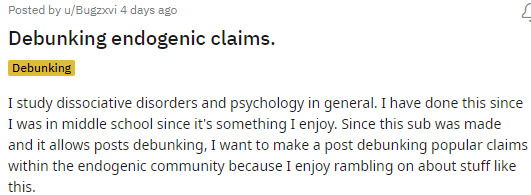
Cool!
I expect a well thought-out post citing lots of sources to prove their points!

No. There are many studies showing DID is heavily correlated with severe and repeated childhood trauma.
It's theorized this correlation is because DID is caused by trauma, but this hasn't been shown. A causal relationship, even if likely, is difficult to establish as it would technically require children to be traumatized to test.
Luckily, this particular nuance isn't actually a point of debate. Nobody on either side is arguing that DID can't be caused by trauma. I think most people on both sides are in agreement that the relationship is a causal one. (Even if I'm going to be pedantic about how that hasn't been proven.)
But just because a causal relationship may exist doesn't mean that's the only possible cause. To think this risks falling prey to the Fallacy of the Single Cause or Causal Oversimplification.
If you were to run an experiment where you hit people on the arm with a hammer, you can successfully prove being hit with a hammer is a cause of broken bones. But it would be fallacious to conclude that hammers are the only possible cause of broken bones.
Whether you can have DID without trauma is an extremely complex question and theories very often fall prey to the above fallacy.
I will say my personally feelings are that DID is virtually always caused by trauma, but people should be open to the potential for other causes to exist in rare cases.

I wouldn't use the word "prove". What I will say is that multiple experts in the field have acknowledged the existence or at least the possibility of plurality/multiplicity without trauma or a disorder.
It is true that there was one paper that suggested a continuum of multiplicity that ranged from what it called" identity disturbance" to dissociative identity disorder. Although it's worth noting that this same paper referred to DID as a severe form of identity disturbance and places them on a continuum together.
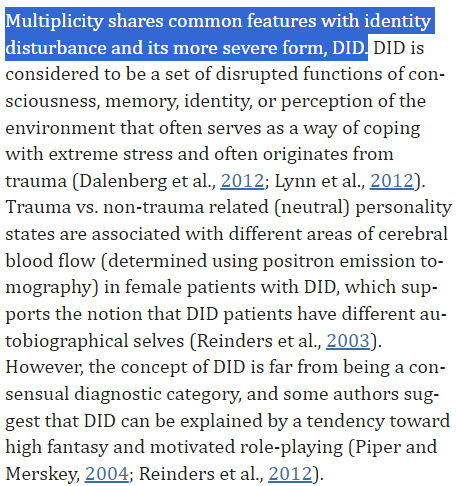
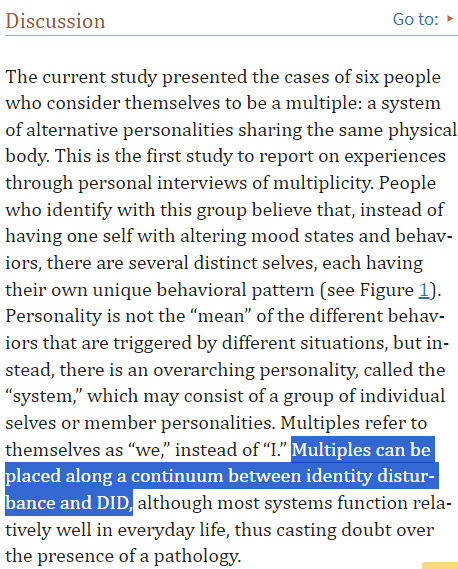
And the claim here that other sources are unreliable is just absurd.
Non-disordered plurality has been acknowledged in the World Health Organization's ICD-11's Boundary with Normality, stating that multiple "distinct identity states" may be present without a disorder.
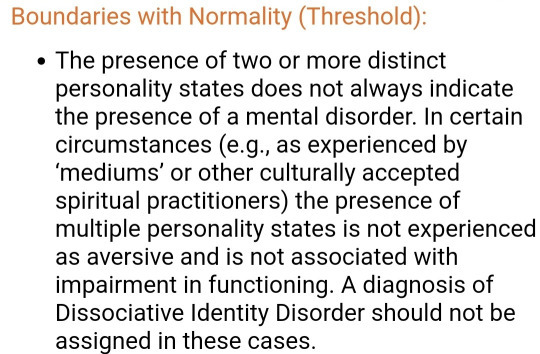
Likewise, the creators of the Theory of Structural Dissociation have said it's possible hypnosis and mediumship may involve "dissociative parts of the personality" that possess "self-consciousness."
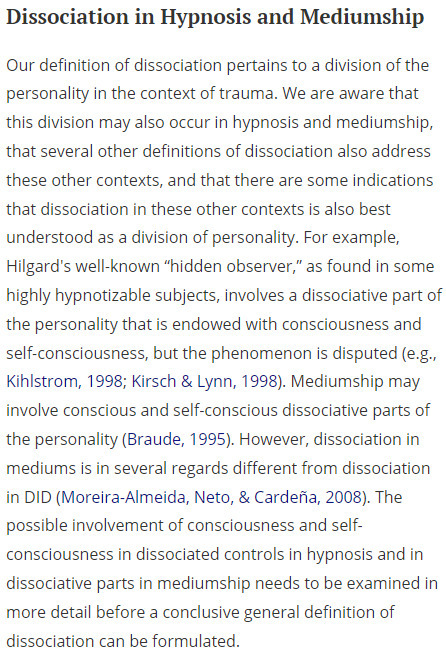
Additionally, the book Transgender Mental Health by Eric Yarbrough has explicitly said you can be plural without a disorder or trauma.
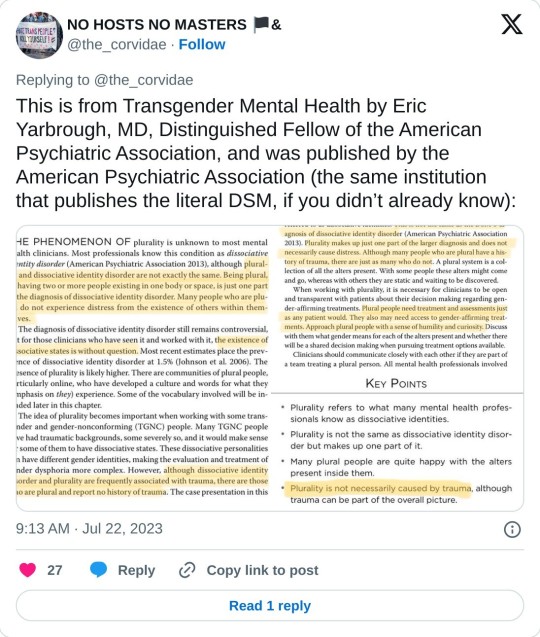
This book was reviewed and published by The American Psychiatric Association.
Notably, there is also no one saying the opposite. There is no academic paper arguing that you can't be plural without a disorder or trauma, or that you need trauma to have multiple "distinct personality states" or anything of the sort. If you look at academic papers, the range is from neutral (this needs to be studied more) to pro (this is a real phenomenon.)
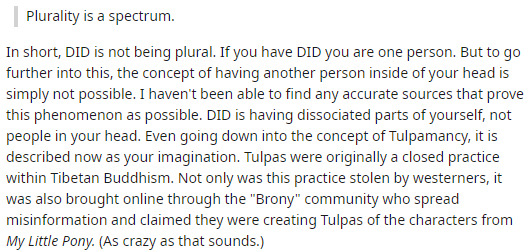
I'm not going to go too far into the appropriation claims beyond saying that Tibetan Buddhism is an open religion, the Dalai Lama has encouraged people of other faiths to use Tibetan Buddhist meditations, and there's no evidence sprul-pa (the practice tulpamancy was based on) was a closed practice.
The appropriation narrative was invented by and pushed by sysmeds, and isn't actually a concern within Buddhist communities. If you want to see this in action, here's a comparison of r/Systemscringe and r/Buddhism opinions on tulpamancy.
The fact that cringe subreddits are way more concerned about the so-called appropriation than actual Buddhist subreddits should be a good indication that this was always more about using Buddhists as a talking point to silence one of the most studied endogenic communities.
As for the whole "DID isn't plural" thing, this is just semantics.
Some DID systems view themselves as parts, others as people. Psychiatrists would say that the whole body makes the person. But there are philosophies that suggest that the ability for dissociated parts to each have their own self-consciousness and agency makes them a person.
When discussing plurality, I personally use the term "agent." It bypasses a lot of these silly semantic arguments over what is or isn't a person. Because whether we're talking about multiple people, dissociated parts, or even spirits, what we're discussing is an experience of multiple agents with their own self-consciousness and and agency.
That's essentially what plurality is.
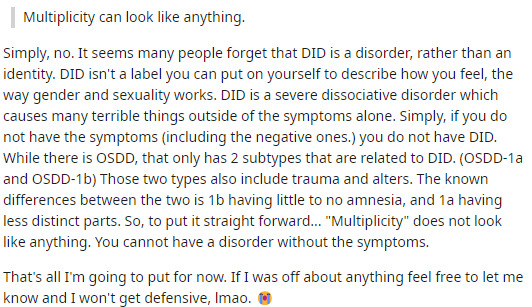
Multiplicity is an experience of being multiple. Again, the World Health Organization's ICD-11 says you can experiences multiple distinct personality states without a disorder. You do NOT need DID or OSDD to experience multiplicity.
If there's a single peer-reviewed academic source anywhere that claims you it's impossible to be plural without DID or OSDD, you're welcome to provide it.
Additionally, I've been unable to find any studies showing a significant correlation between OSDD-1 without amnesia (what's inaccurately called OSDD-1b) and trauma. It's often presumed to exist, but the evidence isn't there.
As you stated earlier, dissociative amnesia is heavily linked to trauma. If dissociative amnesia is a criteria of DID, then naturally that link would exist there as well. So then, if the multiplicity is caused by trauma, we would need to conduct studies into people with OSDD who have no amnesia to confirm that.
From what I've found, no study of this sort has been conducted.
Finally, this asserts that all multiplicity comes from these disorders. A claim that they fail to support in any way. Because they CAN'T support it.
Because again, all the research studying plurality have affirmed that you can be plural without a dissociative disorder.
Well, That Concludes Another Anti-Endo "Debunking" Post With No Sources!
Wait. That's not entirely true! They do link to this one:
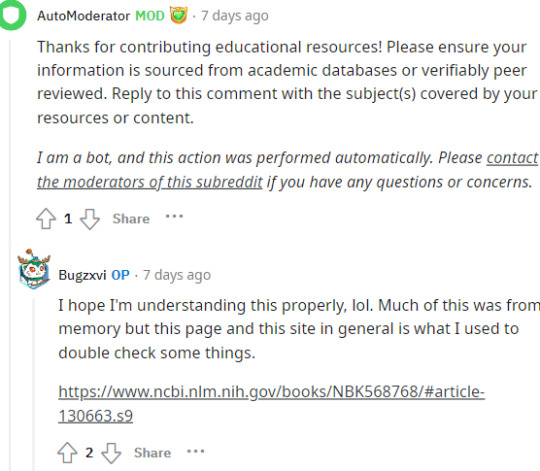
Except it doesn't confirm any of their points, and seems to mostly be added to prevent the automod from removing their post. Like they said, most of this was "from memory."
Meaning they're just regurgitating things they've heard online from unknown sources.
#actually a system#syscourse#multiplicity#sysblr#ableism#sanism#systems#psychiatry#pro endogenic#pro endo#r/systemscringe#systemscringe#reddit#didcringe#r/didcringe#hate group#hate groups
22 notes
·
View notes